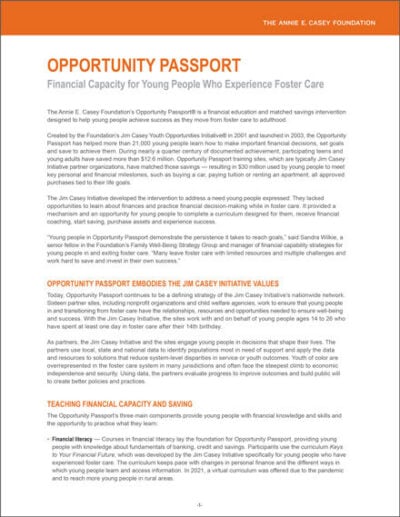Saving for Independence
Most Opportunity Passport participants (32%) used their matched savings to buy a car or pay a housing expense, such as a rental deposit (18%).

Opportunity Passport® is a financial education and matched savings program designed to help young people achieve success as they move from foster care to adulthood. Launched in 2003, it was developed by the Annie E. Casey Foundation’s Jim Casey Youth Opportunities Initiative® to address a need expressed by young people: a lack of opportunities to learn about finances and practice financial decision making while in foster care.
Today, Opportunity Passport continues to be a defining strategy of the Casey Foundation's Jim Casey Initiative and its nationwide network. Sixteen partner sites, including nonprofit organizations and child welfare agencies, work to ensure that young people in and transitioning from foster care have the relationships, resources and opportunities to ensure well-being and success.
The Opportunity Passport’s main components work together to provide young people:
Since the launch of Opportunity Passport, more than 21,000 young people have learned how to set financial goals and save to achieve them. During nearly a quarter century of documented achievement, participating teens and young adults have saved more than $12.6 million.
As part of the program, Jim Casey Youth Opportunity Initiative sites match the young people’s savings. Since 2001, youth participants in Opportunity Passport have invested more than $30 million in matched savings in purchases that meet personal milestones tied to life goals. This includes buying cars, paying tuition or renting an apartment.
Opportunity Passport trains young people in foster care in skills they need to achieve independence. Participants receive lessons in banking, saving, budgeting and then practice their financial capacity skills.
We hope you'll find value in this report. We’d love to get a little information from you, which we'll use to notify you about relevant new resources.